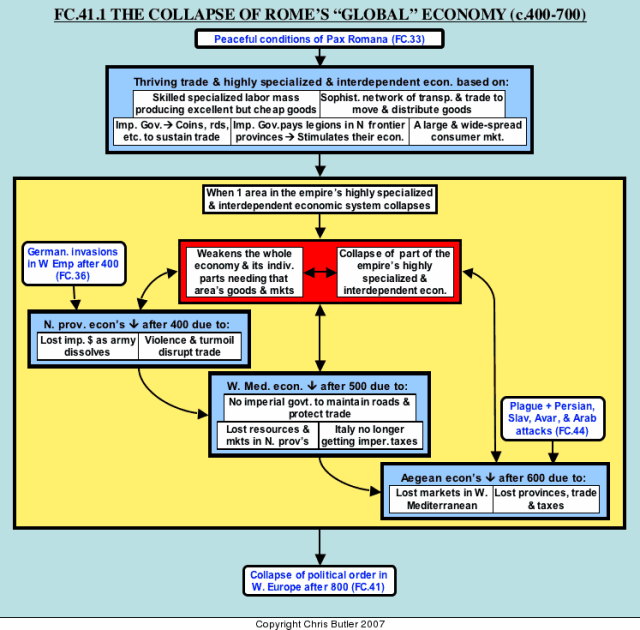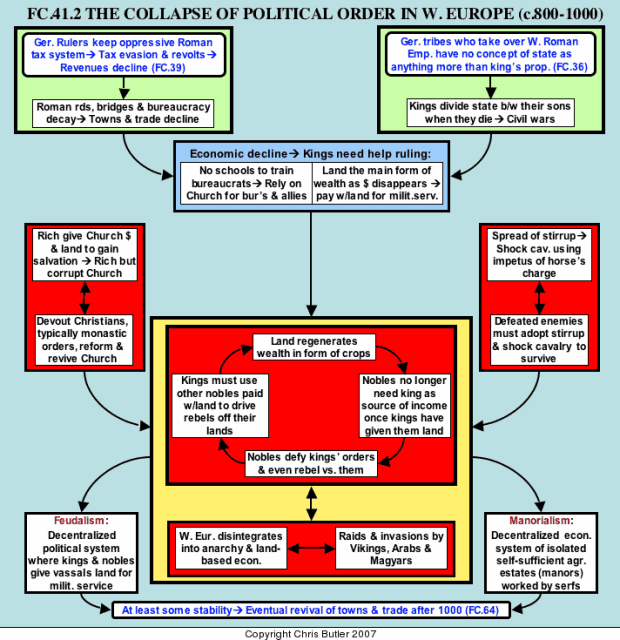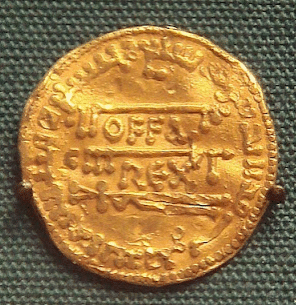...the year 410. In this year Rome was sacked, and the empire gave up trying to defend Britain. While this marks the glorious beginnings of “English history”, as Anglo-Saxon barbarians began their inexorable conquest of lowland Britain, it was also the start of a recession that puts all recent crises in the shade.The economic indicators for fifth-century Britain are scanty, and derive exclusively from archaeology, but they are consistent and extremely bleak.
Under the Roman empire, the province had benefited from the use of a sophisticated coinage in three metals – gold, silver and copper – lubricating the economy with a guaranteed and abundant medium of exchange. In the first decade of the fifth century new coins ceased to reach Britain from the imperial mints on the continent, and while some attempts were made to produce local substitutes, these efforts were soon abandoned.
For about 300 years, from around AD 420, Britain’s economy functioned without coin.
Core manufacturing declined in a similar way. There was some continuity of production of the high-class metalwork needed by a warrior aristocracy to mark its wealth and status; but at the level of purely functional products there was startling change, all of it for the worse. Roman Britain had enjoyed an abundance of simple iron goods, documented by the many hob-nail boots and coffin-nails found in Roman cemeteries. These, like the coinage, disappeared early in the fifth century, as too did the industries that had produced abundant attractive and functional wheel-turned pottery. From the early fifth century, and for about 250 years, the potter’s wheel – that most basic tool, which enables thin-walled and smoothly finished vessels to be made in bulk – disappeared altogether from Britain.
The only pots remaining were shaped by hand, and fired, not in kilns as in Roman times, but in open ‘clamps’ (a smart word for a pile of pots in a bonfire).We do not know for certain what all this meant for population numbers in the countryside, because from the fifth to the eighth century people had so few goods that they are remarkably difficult to find in the archaeological record; but we do know its effect on urban populations. Roman Britain had a dense network of towns, ranging from larger settlements, like London and Cirencester, which also served an administrative function, to small commercial centres that had grown up along the roads and waterways.
By 450 all of these had disappeared, or were well on the way to extinction. Canterbury, the only town in Britain that has established a good claim to continuous settlement from Roman times to the present, impresses us much more for the ephemeral nature of its fifth to seventh-century huts than for their truly urban character. Again it was only in the eighth century, with the (re)emergence of trading towns such as London and Saxon Southampton, that urban life returned to Britain.
For two or three hundred years, beginning at the start of the fifth century, the economy of Britain reverted to levels not experienced since well before the Roman invasion of AD 43. The most startling features of the fifth-century crash are its suddenness and its scale. We might not be surprised if, on leaving the empire, Britain had reverted to an economy similar to that which it had enjoyed in the immediately pre-Roman Iron Age. But southern Britain just before the Roman invasion was a considerably more sophisticated place economically than Britain in the fifth and sixth centuries: it had a native silver coinage; pottery industries that produced wheel-turned vessels and sold them widely; and even the beginnings of settlements recognisable as towns. Nothing of the kind existed in the fifth and sixth centuries; and it was only really in the eighth century that the British economy crawled back to the levels it had already reached before Emperor Claudius’s invasion.
It is impossible to say with any confidence when Britain finally returned to levels of economic complexity comparable to those of the highest point of Roman times, but it might be as late as around the year 1000 or 1100. If so, the post-Roman recession lasted for 600-700 years.We can take some cheer from this sad story – so far our own problems pale into insignificance. But Schadenfreude is never a very satisfying emotion, and in this case it would be decidedly misplaced.
The reason the Romano-British economy collapsed so dramatically should give us pause for thought. Almost certainly the suddenness and the catastrophic scale of the crash were caused by the levels of sophistication and specialisation reached by the economy in Roman times. The Romano-British population had grown used to buying their pottery, nails, and other basic goods from specialist producers, based often many miles away, and these producers in their turn relied on widespread markets to sustain their specialised production. When insecurity came in the fifth century, this impressive house of cards collapsed, leaving a population without the goods they wanted and without the skills and infrastructure needed to produce them locally. It took centuries to reconstruct networks of specialisation and exchange comparable to those of the Roman period.




 Reply With Quote
Reply With Quote





















 In the reverse, it's kinda like saying the British, including soccer hooligans, should be held responsible and should be awarded for the achievements in groundbreaking laws of astrophysics established by Isaac Newton.
In the reverse, it's kinda like saying the British, including soccer hooligans, should be held responsible and should be awarded for the achievements in groundbreaking laws of astrophysics established by Isaac Newton.







